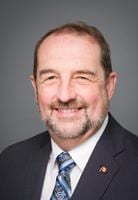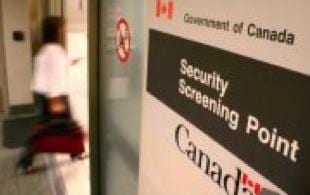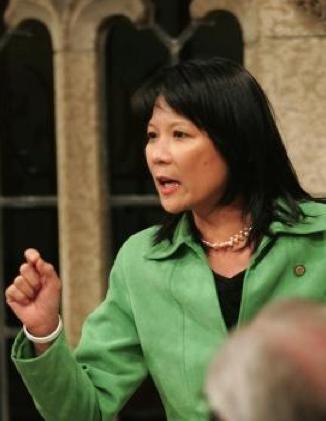
Transport Minister Denis Lebel. Credit: Courtesy photo

Recent changes to flight screening regulations affect trans travellers and could block people from flying. Credit: acclondon.com

NDP MP Dany Morin. Credit: Courtesy photo

Trans activist Christin Milloy. Credit: Milloy's Facebook
UPDATE: Feb 1, 10:50pm – When Xtra posts original documents to the web, we typically use a free online service called Scribd. This involves uploading the file to Scribd’s server and then embedding the document in our web page. On Tuesday, Xtra did just this with email correspondence between reporter Andrea Houston and representatives of Transport Canada. At some time today, however, Scribd removed the document from its servers due to a copyright claim “at the request of Transport Canada.”
We have now copied and pasted the text of our email correspondence below:
Mrs. Houston,
Transport Canada Minister’s office has asked us to provide you with info relating to your inquiry on flight screening:
The security of passengers and their baggage is a priority for the Government of Canada. The regulations are the same as before, since they are those of the International Civil Aviation Organization that are in place in all countries. To comply with the Identity Screening Regulations, airlines in Canada must have procedures allowing them to identify all passengers by using their official identification issued by a recognized government authority. This approach applies to all passengers, regardless of their culture, religion or sexual orientation.
Before the amendment, the Identity Screening Regulations did not explicitly require air carriers to compare and check passengers’ physical appearance against their identification. Transport Canada more clearly defined the requirements in the Canada Gazette in 2010 and 2011, after receiving Governor-in-Council approval. No changes have been made to the order since it was first published in August 2010.
Transport Canada is not aware of any case of a transgendered or transsexual individual in possession of a medical document who has not been permitted to board an airplane since the publication of the Regulations in 2010. If you read the complete Regulations, you will see that paragraph 5.2(2)(a) does not prevent the transgendered and transsexual community from travelling by air. If, for medical reasons, a passenger’s facial features do not correspond to the photo on his or her identification, the air carrier may authorize the passenger to board a plane if he or she provides a medical certificate relating to this.
I hope that helps.
Regards,
Maryse Durette | Conseillère principaleSenior Advisor
Relations avec les médiasMedia Relations 613-993-0055
Transport Canada / Place de Ville (Tour C), Ottawa, Ontario K1A 0N5
Transports Canada / Place de Ville (Tower C) Ottawa (Ontario) K1A 0N5
Government of Canada Gouvernement du Canada
Good afternoon,
Please find below the answers to your questions:
Our Government has ensured that the identification requirements to board an airplane in Canada are not discriminatory; they apply to all passengers, regardless of gender or sexual orientation, and they do not impose barriers to any particular group.
Any passenger whose physical appearance does not correspond to their identification can continue to board an airplane by supplying a letter from a heath care professional explaining the discrepancy.
We have no records of any individual being denied boarding in Canada because they are transgender or transsexual.
The security of our aviation system and air passengers remains a top priority for our Government.
Canadians expect their Government to ensure that individuals who pose a threat to aviation security are barred from flights to, from and within Canada. In order to achieve this, it is essential to verify a passenger’s identity.
Our air security programs achieve this goal without discrimination and in a way that respects Canadian values.
Identity Screening Regulations:
5.2 (1) An air carrier shall not transport a passenger if
· (a) the passenger presents a piece of photo identification and does not resemble the photograph;
· (b) the passenger does not appear to be the age indicated by the date of birth on the identification he or she presents;
· (c) the passenger does not appear to be of the gender indicated on the identification he or she presents; or
· (d) the passenger presents more than one form of identification and there is a major discrepancy between those forms of identification.
(2) Despite paragraph (1)(a), an air carrier may transport a passenger who presents a piece of photo identification but does not resemble the photograph if
· (a) the passenger’s appearance changed for medical reasons after the photograph was taken and the passenger presents the air carrier with a document signed by a health care professional and attesting to that fact; or
· (b) the passengers’s face is bandaged for medical reasons and the passenger presents the air carrier with a document signed by a health care professional and attesting to that fact.
Have a nice day!
Pierre
Pierre Floréa
Attaché de presse, Press Secretary
Cabinet de l’honorable Denis Lebel, ministre des Transports, de l’Infrastructure et des Collectivités et ministre de l’Agence de développement économique du Canada pour les régions du Québec,
Office of the Honourable Denis Lebel, Minister of Transport, Infrastructure and Communities and Minister of the Economic Development Agency of Canada for the Regions of Quebec.
UPDATE: Feb 1 – The federal Conservatives “snickered” during question period Feb 1 and dismissed concerns that transgender Canadians can now be grounded from air travel.
NDP MPs Randall Garrison, Dany Morin and transportation critic Olivia Chow have drafted a motion to rescind the recently added section in the Identity Screening Regulations, which states that an air carrier “shall not transport a passenger if the passenger does not appear to be of the gender indicated on the identification he or she presents.” The motion will be on the Transport Committee agenda Feb 7, Chow says.
Chow says the changes to the regulations do not increase national security and they are not international standard. Instead, she says, the new rules further inconvenience trans people trying to fly out of Canada.
During question period, Transport Minister Denis Lebel rejected concerns from the NDP, saying his priority is “safety.”
“The minister has failed to recognize that this provision clearly discriminates against transgender Canadians, which constitutes a violation of their fundamental mobility rights under the Charter,” Chow says.
Chow says Lebel and other Conservative MPs were openly “snickering” and disrespectfully mocking Garrison, Morin and Liberal MP Justin Trudeau as they pressed the government for answers.
“The response was outrageous,” Chow says. “It’s totally ridiculous. If you listen to the audio, you can hear [Conservative MPs] snickering in the background.”
Garrison says Conservative MPs were “making light” of a very serious situation.
“To them, I guess there’s something funny about transgendered people. It was quite offensive,” he says. “This is a basic violation of rights and fuels discrimination of transgender people, not only with the regulation, but actually laughing at the question.”
Calling it “unacceptable,” Morin asked if the government plans to correct the mistake.
Lebel responded, speaking in French: “What’s unacceptable is that this party [NDP] regularly asks us to strengthen security in Canada’s airports for air travel. Mr Speaker, now they want us to be less strict in regard to air travel. All passengers, no matter who they are, are ensured, by the people working in airports, air safety and air security, [which] is very important to us.”
Video of Garrison and Morin.
Video of Trudeau.
Since the story broke on the blogs Jan 29, trans people have responded with outrage across Canada. Overwhelmingly, activists agree that the policy would be illegal if Canada had explicit protection for trans people in the federal Human Rights Act.
Christin Milloy, who helped spread the word quickly on social media, is urging all Canadians to support Bill C-279, a private-member’s bill reintroduced by Garrison that is awaiting second reading in the House of Commons. MP Hedy Fry has introduced a similar bill. “Even with a Conservative majority, I’m confident it will pass. Not every Conservative will vote against it,” Milloy says.
Meanwhile, Vancouver lawyer barbara findlay, who specializes in issues affecting lesbian, gay, bisexual and trans communities, plans to challenge the regulation.
“In my legal opinion, people are correct to be very concerned about this legislation,” she says. “It gives the government the power to decide what happens to you based on your gender conformity.
“You don’t have to be trans to be affected by this. This affects all gender-variant individuals, gender-queer and anyone who is gender non-conforming. This is a clear violation of Canada’s Human Rights Act and the Charter.”
If you’re a trans person who has been affected by the policy change and would like to be involved in a federal human rights complaint, email findlay at bjf@barbarafindlay.
Jan 31 – Trans people could be blocked from flying in Canada
Activists say recent changes to flight screening regulations target transgender travellers and could block people from boarding airplanes in Canada.
NDP MP Dany Morin says he is calling on the federal government to clarify the changes. “The transgender community needs to know if they can board a flight.”
Introduced July 29, changes to the identity screening regulations state that an air carrier “shall not transport a passenger if the passenger does not appear to be of the gender indicated on the identification he or she presents.”
The regulations are not legislation, which would have had to pass through readings and a vote in the House and Senate. Rather, the screening regulations are a set of rules implemented unilaterally by the Ministry of Transportation, as part of Canada’s so-called Passenger Protect program.
Jennifer McCreath is a transsexual marathon runner and blogger in Newfoundland who raised a red flag to trans activists Jan 29 when she posted email correspondence from Air Canada on her blog. Air Canada states unequivocally that it plans to enforce federal law.
“Who will be the first trans person openly rejected from getting on an airplane?” she says. “This policy change seems to have been overlooked. It shows how easy it is for the government to sneak changes in.”
The federal government already requires that trans people undergo sex reassignment surgery (SRS), or provide a letter guaranteeing the procedure will take place within a year, to change the sex marker on their passports.
Liberal MP Justin Trudeau argued the issue on Twitter on Jan 31 with rightwing media. He says he also wants answers. “This is a step too far and something that is simply not necessary, even for security sake. This goes back to this government’s very old-fashioned thinking around gender issues.”
Morin sent a letter to the minister of transport, Denis Lebel, Jan 30 and plans to ask a question in the House of Commons. Lebel did not respond to Xtra’s interview requests.
“The first step is to have the government answer for this, then the next step is for them to correct it,” Morin says. “We want answers now.”
Lebel’s office released a statement by 1pm Jan 31, stating, “We have no records of any individual being denied boarding in Canada because they are transgender or transsexual.”
Rather than wait for a trans person to be blocked from flying, trans activist Christin Milloy says the regulations need to be rewritten immediately. “We can’t have regulations which judge people based on how they appear to be gendered. It is unacceptable.”
Trans Lobby Group chair Susan Gapka calls the regulation a “clumsy policy that targets trans people,” something that would not be allowed if federal protections were included in Canada’s Human Rights Act.
Gapka says this issue illustrates why it’s important to support the new version of Bill C-389, which will amend the Act to enshrine protections against discrimination against trans people. In the previous Parliament, the bill had successfully passed in the House of Commons, only to die on the Senate floor when the election was declared.
“Whether this new screening regulation was malicious or a mistake — and it appears to be malicious — it can cause harm to people,” Gapka says. “Will Harper reimburse trans people for their missed flight if they are pulled off a plane?
“To the government, the security at airports is more important than a disadvantaged group of people.”
In its statement Transport Canada says, “Any passenger whose physical appearance does not correspond to their identification can continue to board an airplane by supplying a letter from a heath care professional explaining the discrepancy.”
Gapka says she “stringently opposes” this.
“I oppose the idea that I would need to carry a special letter from my doctor proving I have the same access as everyone else has,” she says. “I think that is differential treatment. This is a violation of basic human rights. It’s wrong to treat people differently.”
Gapka is also a Pride Toronto board member and notes that the changes could result in a negative effect on tourism. Looking ahead to WorldPride 2014, she says, some trans delegates may decide not to fly to Toronto if they can’t fly home.
This is part of a larger fight, she says. It should be easier for trans people to change the sex designation on legal documents to match their identities. She would like to see the whole system harmonized and modernized.
“There is a real lack of understanding by this Conservative government on how these policies affect the trans community,” she says.
Identity Screening Regulations Letter Minister Transport

 Why you can trust Xtra
Why you can trust Xtra


